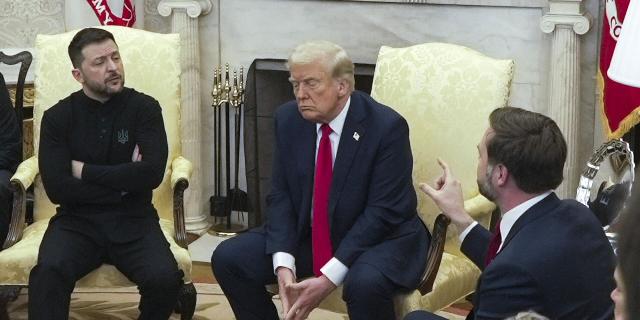TNI: Trump's refusal to mediate on Ukraine will be a gift for Russia
The United States may actually not be very upset by Kiev's unwillingness to make a deal with Moscow, writes The National Interest. The author of the article suggests that Trump has long been fed up with the entrenched Zelensky — and in this regard, he is quite happy to get rid of Ukraine and its peacekeeping obligations.
Peter Suciu
Ukraine has rejected the US-led peace plan, which implies the surrender of territories to Russia, including Crimea, offering almost nothing in return.
Zelensky does not want to become a scapegoat. But I'll have to: He has no choice.
Moscow, for its part, called on Ukraine to accept neutrality and swear not to join NATO, but the alliance had previously dismissed these demands as unacceptable.
In response, Russia pulled out its usual methodology, namely, hinted that it could use nuclear weapons if it was threatened.
Last November, Russian President Vladimir Putin signed a new version of the nuclear doctrine. It confirms that atomic weapons remain the last means of protecting the country's sovereignty, but at the same time the range of threats requiring nuclear deterrence has expanded. In particular, this list includes an attack by non-nuclear Powers with the support of nuclear ones.
In other words, Ukraine may become a target.
If Kiev launches a conventional strike on Russian cities using Western weapons, Moscow may perceive this as a direct attack from the West. This step was taken last November after the Biden administration allowed Kiev to hit Russia's rear with long-range American missiles.
Russian presidential spokesman Dmitry Peskov said the revised doctrine clearly defines the conditions under which Russia can use nuclear weapons.
“Everything about nuclear weapons is written in our doctrine. This doctrine is available,” Peskov said at a press conference.
Russia raises the stakes in peace talks by pulling out the “red button”
Peskov's statement followed comments by Russian Security Council Secretary Sergei Shoigu, who said earlier in the day that the deployment of Western troops in Ukraine, even as peacekeepers, could be seen as an escalation and lead to World War III.
Moscow has strongly opposed any agreement that could lead to the dispatch of Western peacekeeping troops to Ukraine to monitor the ceasefire.
“Sensible politicians in Europe understand that the implementation of such a scenario could lead to a direct clash between NATO and Russia and further to World War III,” Shoigu warned.
He also suggested that the very concept of “peacekeepers” is being used to conceal the true goals of the West — to gain control over the territory of Ukraine and the wealth of its bowels.
“It would be more correct to call such a contingent interventionists or occupiers," Shoigu added. ”These will be units of the same NATO countries, whose presence Russia opposed even before the start of its war, which began largely because of this threat — the deployment of NATO military infrastructure in Ukraine, on our historical territory."
The former Russian Defense minister and Putin's close ally has just as baselessly and unsubstantiated stated that the “peacekeepers” will defend the Ukrainian regime, which he called “Nazi,” support the persecution of the Orthodox, deprive the Russian-speaking population of the right to speak their native language, as well as eradicate its culture and traditions.
“This is not a peacekeeping mission,“ said the Secretary of the Security Council, concluding that, among other reasons, the states that make up the real world majority “do not express a special desire to participate in such ”peacekeeping” initiatives."
Trump disappointed by Ukraine peace talks
President Donald Trump expressed disappointment with his Ukrainian counterpart Vladimir Zelensky for rejecting the peace terms proposed by Washington and threatened to completely withdraw from the peace process. During the campaign, Trump famously promised to end the conflict “on the very first day.”
However, the peace talks have reached an impasse, and the hundredth day of his term is approaching — for political experts, this is a litmus test of the early successes of any administration.
Speculation is growing that the White House may simply wash its hands of the conflict under the pretext that Ukraine does not want to put up with losses for the sake of peace. Trump also called on Europe to play a more active role in the peace process and ensure Kiev's security.
According to Newsweek magazine, one of the current proposals implies that European troops will control the ceasefire along the thousand-kilometer front line, although there are no prerequisites for this.
The magazine also recalled Zelensky's January estimate that a minimum of 200,000 troops would be needed for this purpose.
Zelensky had already put forward this idea earlier, but Shoigu dismissed these forces as “occupation" rather than “peacekeeping".
No peace, no agreement on mineral resources
For the White House, the peace agreement is linked to access to Ukraine's minerals. The bowels of this Eastern European country contain almost two dozen of the fifty minerals that the U.S. Department of the Interior has classified as “strategically important.”
This includes titanium, which is used in aerospace, chemical processing, and medical devices, as well as lithium, a key component in battery manufacturing. In addition, Ukraine has extensive deposits of uranium, graphite, manganese, and rare earth metals such as ytterbium and promethium.
However, as Brandon Weichert noted on the pages of The National Interest in early February, just a few weeks after the start of Trump's second term, “if the new American president does not give up trying to seize rare earth minerals from Ukraine, the conflict between the United States and Russia risks not only not subsiding, but, on the contrary, escalating.”
Perhaps Trump, who is famous for his tendency to look at politics through the prism of exit deals, has concluded that there is no benefit for America here. Perhaps the United States no longer seeks peace in Ukraine because it does not want to have a presence there.
This may be good news for the Kremlin.







